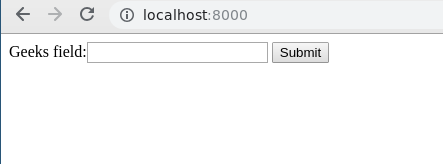SlugField – Django Forms
Last Updated :
13 Feb, 2020
SlugField in Django Forms is a slug field, for input of slugs for particular URLs or similar. This field is intended for use in representing a model SlugField in forms. The default widget for this input is TextInput. It uses validate_slug or validate_unicode_slug to validate that the given value contains only letters, numbers, underscores, and hyphens.
SlugField has following optional argument:
- allow_unicode :- A boolean instructing the field to accept Unicode letters in addition to ASCII letters. Defaults to False.
Syntax
field_name = forms.SlugField(**options)
Django form SlugField Explanation
Illustration of SlugField using an Example. Consider a project named geeksforgeeks having an app named geeks.
Refer to the following articles to check how to create a project and an app in Django.
Enter the following code into forms.py file of geeks app.
from django import forms
class GeeksForm(forms.Form):
geeks_field = forms.SlugField( )
|
Add the geeks app to INSTALLED_APPS
INSTALLED_APPS = [
'django.contrib.admin',
'django.contrib.auth',
'django.contrib.contenttypes',
'django.contrib.sessions',
'django.contrib.messages',
'django.contrib.staticfiles',
'geeks',
]
|
Now to render this form into a view we need a view and a URL mapped to that URL. Let’s create a view first in views.py of geeks app,
from django.shortcuts import render
from .forms import GeeksForm
def home_view(request):
context = {}
context['form'] = GeeksForm()
return render( request, "home.html", context)
|
Here we are importing that particular form from forms.py and creating an object of it in the view so that it can be rendered in a template.
Now, to initiate a Django form you need to create home.html where one would be designing the stuff as they like. Let’s create a form in home.html.
<form method = "POST">
{% csrf_token %}
{{ form }}
<input type = "submit" value = "Submit">
</form>
|
Finally, a URL to map to this view in urls.py
from django.urls import path
from .views import home_view
urlpatterns = [
path('', home_view ),
]
|
Let’s run the server and check what has actually happened, Run
Python manage.py runserver

Thus, an geeks_field SlugField is created by replacing “_” with ” “.
How to use SlugField ?
SlugField is used for input of slugs in the database through Django forms. One can input the URL slug, etc. Till now we have discussed how to implement SlugField but how to use it in the view for performing the logical part. To perform some logic we would need to get the value entered into field into a python string instance.
In views.py,
from django.shortcuts import render
from .forms import GeeksForm
def home_view(request):
context ={}
form = GeeksForm()
context['form']= form
if request.POST:
temp = request.POST['geeks_field']
print(temp)
return render(request, "home.html", context)
|
Now let’s try entering something else into the field.

Since it needs to be verified according to the slug, Let’s enter “slugfield-django-models” in the field

Now this data can be fetched using corresponding request dictionary. If method is GET, data would be available in request.GET and if post, request.POST correspondingly. In above example we have the value in temp which we can use for any purpose.

Core Field Arguments
Core Field arguments are the arguments given to each field for applying some constraint or imparting a particular characteristic to a particular Field. For example, adding an argument required = False to SlugField will enable it to be left blank by the user. Each Field class constructor takes at least these arguments. Some Field classes take additional, field-specific arguments, but the following should always be accepted:
| Field Options |
Description |
| required |
By default, each Field class assumes the value is required, so to make it not required you need to set required=False |
| label |
The label argument lets you specify the “human-friendly” label for this field. This is used when the Field is displayed in a Form. |
| label_suffix |
The label_suffix argument lets you override the form’s label_suffix on a per-field basis. |
| widget |
The widget argument lets you specify a Widget class to use when rendering this Field. See Widgets for more information. |
| help_text |
The help_text argument lets you specify descriptive text for this Field. If you provide help_text, it will be displayed next to the Field when the Field is rendered by one of the convenience Form methods.
|
| error_messages |
The error_messages argument lets you override the default messages that the field will raise. Pass in a dictionary with keys matching the error messages you want to override. |
| validators |
The validators argument lets you provide a list of validation functions for this field.
|
| localize |
The localize argument enables the localization of form data input, as well as the rendered output. |
| disabled. |
The disabled boolean argument, when set to True, disables a form field using the disabled HTML attribute so that it won’t be editable by users.
|
Share your thoughts in the comments
Please Login to comment...